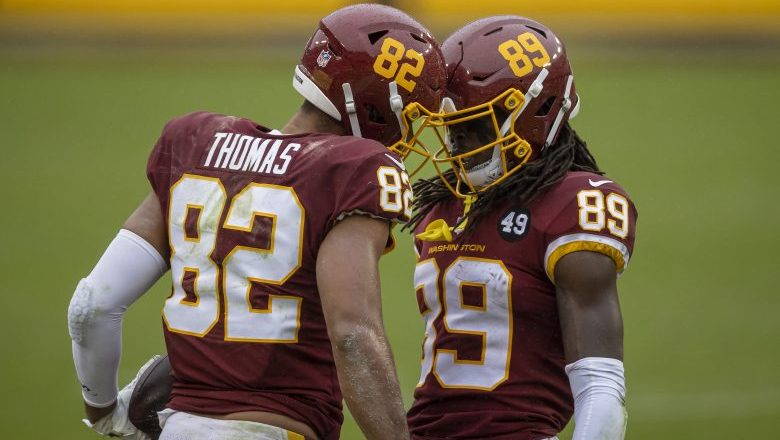
Washington is among the league leaders with $97 million of salary available so trimming salary by making a few salary cap casualties hasn’t been talked about enough. A new regime from the top down with so many assets gives them the ability to remake the roster while attempting to field a competitive team.
General Manager Adam Peters begun the purge when he shipped out defensive ends Chase Young and Montez Sweat for draft capital in a fire sale not often seen in the NFL. Some future decisions may involve cutting ties with a couple of established veterans whose salaries have bloated past their performance.
While the Commanders need a mixture of youth and talent, letting veteran players of this team find new homes could be about planning for the future as well as changing the culture in D.C.
Pulling the Plug on the Expiriment
Tight End Logan Thomas played quarterback at Virginia Tech before entering the league back in 2014 as a fourth-round pick by Arizona. Thomas would make a position change which may have intrigued teams enough to give him more time to adjust to the nuances of a new assignment.
Three squads and 35 catches later, Washington gave him an opportunity signing him a two-year $6.1 million deal to prove himslef. His 72 catches for 670 yards and six touchdowns in 2020 earned him a three-year extension just north of $24 million.
His production plummeted after that season and time may be running out for the converted quarterback. Thomas has accounted for just over $15.1 million in cap space in the last two seasons and carries a cap hit of $8.2 million in 2024.
With a $5.3 million base salary and a roster bonus of $500,000 due on the third day of the new league year, the 33-year-old Thomas is certainly a cap casualty candidate.
If released before his roster bonus is due, the Commanders would only have to account for the $1.75 million in prorated bonus money still owed to the player but would free up an additional $6.5 million in cap space to an already insane treasure chest of capital.
The Blindside Mainstay
After seven seasons in Chicago, left tackle Charles Leno bolted for Washington on a one-year $4 million deal. Like Thomas before him, his performance earned him a three-year $37 million extension with the team.
Entering the final year, the soon-to-be 33-year-old could prompt this new staff to look for a younger, cheaper alternative. Leno has a $15.5 million cap hit if kept on the roster. With $3.75 million remaining from his prorated bonus, a Post-June-1st cut would net the Commanders $11.7 million in cap space.
If kept on the roster, the $4.5 million cap hit the team will incur in 2025 whether Leno is on the team or not was an attempt by the prior administration to lower cap hits from his salary to gain more cap space.
That money left from his void year could loom large from a rebuilding standpoint. Paying for the mistakes of your predecessor past your inaugural season is a great way to get noticed, and not in a good way either.
On the field, Leno has been a good pass protector yet inconsistent in the run game. As one of their better free agency moves, Leno finally missed his first three games as a Commander this past season.
His good play with history of staying healthy is a positive sign but a team intent on changing the direction of the franchise could mean difficult moves remain ahead.
Could There be More Casualties?
The larger contracts the Commanders have are largely justifiable. Linebacker Jamin Davis will command the eight highest salary cap hit on the team and he is on a first-round rookie contract. That doesn’t mean everyone is safe.
Center Nick Gates would have to be Post June 1 cut as doing so before doesn’t make financial sense. Even then, the money saved ($2 million) would still be more than his dead money hit ($3.6 million).
His poor prformance led to him being benched in favor of Tyler Larsen who received praise for bringing the offensive line together by Commanders quarterback Sam Howell.
Releasing 34-year-old punter Tress Way could give the team a little over $3 million in cap space while leaving just $600,000 in dead money. Letting go of a two-time Pro Bowl punter and fan favorite would be an unpopular move. New special teams coordinator Larry Izzo said Way is “one of the best in the business.”
From a business standpoint, paying a punter who has seen a steady decline the last few years may be a needed unexpected jolt to the fanbase signaling a new era. Trimming too much could cause an early rift between the new ownership and their fans.


















































































Comments
Potential Cap Casualties in Washington